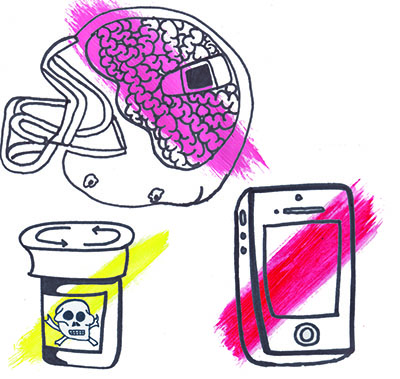From Cell Phones to Right-to-Die to Concussions — California’s New Laws of 2017

April 17, 2017
Cell Phone Safety: The use of a hand-held wireless phone or wireless electronic device while driving, will no longer be allowed unless the device is mounted on the vehicle windshield or dashboard in a way that does not restrict the driver’s view of the road. This law was largely influenced by the courtroom arguments from drivers charged with texting or calling while driving; the drivers claimed that they were merely using their GPS. Officer Juan Galvan with California Highway Patrol explained in an article by the L.A. Times that, “People were holding it in their hands using their GPS. This new law is going to eliminate that all together and now cell phones will have to be mounted.” Now, drivers are allowed a single tap or swipe on the phone as long as it is mounted to the vehicle. If caught handling a phone while driving, you could receive a fine initially of $20 and then $50 for each following offense.
Student Opinion — Junior Sophia Fay: “I’m not a fan of this law because sometimes I need to go to a new part of town and I don’t know how to get there. Before I would just pull out my phone, enter in the address and hold the phone next to my steering wheel and it would direct me to where I needed to go, now I have to buy a mount for my car? It’s very inconvenient and in my opinion, not necessary. I understand why you can’t text or call but all I do is occasionally glance at it while I’m driving, I don’t think it’s nearly as distracting as texting.”
Concussion Safety: Similar to a previous law aimed at protecting high school student-athletes who may have suffered head injuries, youth sports organizations are now required to notify the parents or guardians of athletes younger than 17 years old who have been removed from activity because of a suspected concussion. It also requires athletic organizations to offer concussion and head injury education to coaches and administrators on a yearly basis. The organizations also have to comply with athlete removal provisions and return-to-play protocol. The biggest problem with the law is that it states that the return-to-play protocol must be conducted “under the supervision of a licensed health care provider.” It is likely that a concussed athlete will not be directly supervised through each step of a graduated return to play protocol by a licensed health care provider, leading to issues regarding the proper standard of care.
Teacher Opinion — Dean Coach Shane Lopes: “I am very familiar with this topic and am in full agreement with the law, especially on the regular education of coaches on how to prevent and handle injuries. It is the responsibility of the parents, coaches, trainers and athletic directors that every detail of the given “return to play protocol” be followed. I have found the process to be thorough and in the best interest of the student-athlete.”
Right-to-Die: Terminally ill patients in California will be allowed to use experimental drugs, which do not have full regulatory approval, to decide to end their lives. The law came about after Brittany Maynard, a Bay Area woman with terminal brain cancer, moved to Oregon before taking her life using drugs. The End of Life Option Act gives patients access to lethal medication to accept death on their own terms. However, not everyone supports this new law. Another concern is that in our current state, millions of people are forced to rely on government-subsidized care. It is possible that the government would be more willing to prescribe suicide pills rather than months and years of expensive medicine treating a patient’s terminal illness. To avoid this, part of the law states that the patient has to specifically request for the lethal medication, and the doctor cannot bring it up with the patient.
Teacher Opinion — AP Psychology Teacher Meghan Roarty: “For those facing terminal illnesses, the End of Life Option Act can provide comfort, support, and a feeling of dignity for both the individual and the entire family involved as watching a loved one suffer significantly and unnecessarily is one of the most difficult things to endure. There are of course ethical concerns associated with the choice to end one’s life, but the law comes with specific requirements, such as the patient needing to be mentally competent and with a prognosis of less than six months to live. Many worry that this law will lead to huge increases in those choosing to end their life, but statistics from other states, such as Oregon, that already have a legal process for patients to obtain aid in dying have been informative about what to expect. I believe people have the right to choose to live a good life, and when tragically faced with very unfortunate circumstances, should have the right to choose to have a good death as well.”
Minimum Wage: The Fair Wage Act of 2017 will be gradually raising the minimum wage by one dollar each year until it reaches fifteen dollars per hour by year 2021, for example this year the Minimum wage will be ten dollars. The state council’s proposal was designed to increase the minimum wage by 2020 with more than 25 workers. The new law also allows workers to earn a minimum of six paid sick days each year, rather than the three required before. The law’s opposers are saying that those who have leapt ahead on this issue have been feeling the pinch of job losses and without jobs, a higher minimum wage will not help anyone. An example of this is in San Francisco where a $15 minimum wage was passed in 2014. Following the law’s passage, some of the city’s 100 top restaurants closed its doors and cited the minimum-wage hike as a determining factor and the unemployment rate there was raised to around 22 percent. A typical franchisee, like McDonald’s for example, sells about 2.6 million dollars worth of food, leaving them with about 156,000 dollars in profit. A 15 dollar hourly wage would require up to three-quarters of that profit, or for some locations the entire profit. The average U.S. citizen, however, is overwhelmingly in support of a higher minimum wage; according to the National Employment Law Project, an estimated six in ten Americans support a $15 minimum wage.
Student Opinion — Annabelle Finefrock: “While I believe that minimum wage isn’t enough to support a family, minimum wage jobs were originally intended for high school and college students as their first jobs. By raising the minimum wage to 15 dollars, businesses will have a hard time keeping up and will not be able to hire as many workers which will ultimately make the unemployment rate go up, hurting those who would benefit from a higher minimum wage.”
Sexual Assault: Sexually assaulting an unconscious or severely intoxicated person is now a crime ineligible for probation. This new law will clarify that a victim incapacitated by drugs or alcohol cannot consent to sex. The clarification in the law came after former Stanford swimmer Brock Turner was given six months in jail and released early for assaulting an unconscious woman. Also added to the law is a new statute of limitations. Before the statute of limitations for sexual assault was ten years, but now, due to the new law, if someone is sexually assaulted, the victim can report it at any time in the future and the case can be prosecuted regardless of how much time has passed. The rape allegations against host Bill Cosby influenced the passage of this new law as well.
Student Opinion — Junior Kendall White: “I’m surprised we haven’t had a law like this sooner because I think it will be very beneficial. Sexual assault is extremely devastating for a victim, especially when a victim has been through so much and then the law lets their assailant walk free or with barely any jail time. I’m glad to see that California is taking the necessary steps to properly support the victims of sexual based offenses.”
Gender Neutral Bathrooms: All single-user toilet facilities in an business or public place must now be changed to all-gender facilities. This new law will not only help those with non-conventional genders, but the law’s supporters say that gender-neutral restrooms would also help parents with children of a different gender and adults caring for aging parents. Democratic Assemblyman Phil Ting of San Francisco said his legislation would establish the nation’s most inclusive restroom-access law and “chart a new course of equality for the nation.” While this law does not require every public place to have a gender-neutral bathroom, it’s a huge step towards the inclusivity of gender identities.
Student Opinon — Junior Kathryn Norris: “I personally don’t understand why this issue is such a big deal, but if it helps people then I support it. I think that people should just go to the bathroom that they feel most comfortable in, but I like how it will help parents with a child of a different gender. This law may be an inconvenience for businesses, especially if soon the law might require businesses to build new bathrooms. but if it helps people with an unconventional gender, then I support it.”
Felons Right to Vote: Felons who are not currently doing time in state or federal prisons are now allowed to vote. Assemblywoman Shirley Weber believes that it is up to California to set an example at a time when other states are trying to limit voting rights. While the opposers to the new law such as the President of the California State Sheriffs’ Association, Sheriff Donny Youngblood believe that, “there have to be consequences to your actions, and the consequences of being a convicted felon are that you can’t vote.” The California Police Chiefs Association also argues that the state should not be restoring a right traditionally lost when people commit serious crimes. Many Republican lawmakers are claiming that this new law will compromise the integrity of elections.
Teacher Opinion — AP U.S. History Teacher Lindsay Woodard: “Taking away anyone’s right to vote makes me uncomfortable. It would make sense if someone were convicted for voter fraud, but in the vast majority of cases, felons are convicted for violence and drug-related offenses that have nothing to do with voting. Committing a crime shouldn’t make someone less of a citizen, and all American citizens are guaranteed the right to vote. The fact that California is leading the way in restoring the vote to felons who are not currently incarcerated gives me hope. I’m hoping that other states will follow suit.”
Marijuana: It is now legal to smoke weed in private and be in possession of it throughout the state of California. However without a medical marijuana card, Californians will be unable to purchase from dispensaries until 2018 when the state will begin issuing retail licenses for the sale of marijuana. According to The L.A. Times, black market sales will still remain illegal. For adults over the age of 21, you can’t just walk into a medical dispensary and start buying without a patient card, but you can use, possess, share, and grow cannabis at home. The law’s supporters are claiming that marijuana legalization is good for social justice, and drug laws have been used for too long as a way to arrest and incarcerate minorities at a much higher rate than whites.Supporters also argue that studies have shown that marijuana is less dangerous than alcohol and its use should be considered as normal as having a glass a wine. The law also helps the government to avoid creating the perfect black market for criminals, while still being able to tax and regulate cannabis.
Student Opinion — Senior Will Bartholomew: “The legalization of marijuana will bring hundreds of millions in tax dollars, it will decriminalize lower tier risk ‘felons’ that were charged for possession, and it will hopefully keep weed from pouring over our border from Mexico.”






